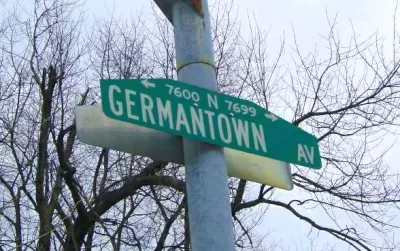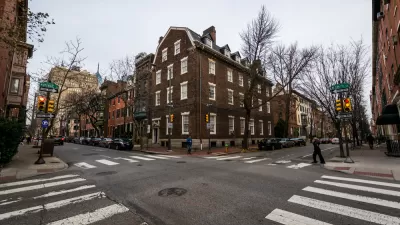While planning departments around the country make news for removing exclusionary zoning and parking requirements, many neighborhoods still show a strong preference for parking minimums and development limits. Case in point: Germantown, Philadelphia.

"The Philadelphia City Planning Commission, or PCPC, is eying a rezoning plan for northern Germantown, with a focus on imposing new rules mandating developers provide parking with their projects and putting limitations on building," reports Ryan Briggs.
The "Germantown North Zoning Remapping" is currently under public review, and is clearly tailored to respond to local concerns about perceived parking problems and development in the historic neighborhood.
"Perhaps most significantly, the plan would expand an existing parking overlay along Germantown Avenue to an area between Rittenhouse to Johnson streets," reports Briggs. "The overlay mandates that any new developments that feature more than 10 units provide off-street parking lots or garages."
According to Briggs, some of the development disincentives included in the rezoning don't match the vision set forth by the citywide Philadelphia 2035 plan adopted in 2011—the first new comprehensive plan for the city in 50 years.
In its own citywide “Philadelphia 2035” planning guidelines, the City Planning Commission broadly set a goal of directing more “multifamily housing development to commercial streets and train stations” in the same area now targeted for rezoning. But parts of the proposed rezoning along Germantown Ave, which hosts transit agency SEPTA’s Route 23 bus, would instead make some of those developments more complex and difficult to construct.
More details on the changes that would be implemented with the currently proposed zoning map are included in the source article.
FULL STORY: Germantown rezoning highlights neighborhood tensions over parking, density

Trump Administration Could Effectively End Housing Voucher Program
Federal officials are eyeing major cuts to the Section 8 program that helps millions of low-income households pay rent.

Planetizen Federal Action Tracker
A weekly monitor of how Trump’s orders and actions are impacting planners and planning in America.

Ken Jennings Launches Transit Web Series
The Jeopardy champ wants you to ride public transit.

Washington Legislature Passes Rent Increase Cap
A bill that caps rent increases at 7 percent plus inflation is headed to the governor’s desk.

From Planning to Action: How LA County Is Rethinking Climate Resilience
Chief Sustainability Officer Rita Kampalath outlines the County’s shift from planning to implementation in its climate resilience efforts, emphasizing cross-departmental coordination, updated recovery strategies, and the need for flexible funding.

New Mexico Aging Department Commits to Helping Seniors Age ‘In Place’ and ‘Autonomously’ in New Draft Plan
As New Mexico’s population of seniors continues to grow, the state’s aging department is proposing expanded initiatives to help seniors maintain their autonomy while also supporting family caregivers.
Urban Design for Planners 1: Software Tools
This six-course series explores essential urban design concepts using open source software and equips planners with the tools they need to participate fully in the urban design process.
Planning for Universal Design
Learn the tools for implementing Universal Design in planning regulations.
Heyer Gruel & Associates PA
Ada County Highway District
Institute for Housing and Urban Development Studies (IHS)
City of Grandview
Harvard GSD Executive Education
Toledo-Lucas County Plan Commissions
Salt Lake City
NYU Wagner Graduate School of Public Service



























